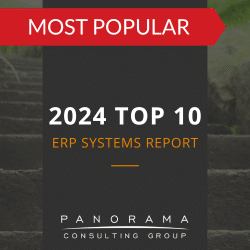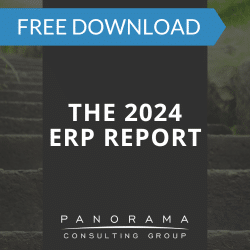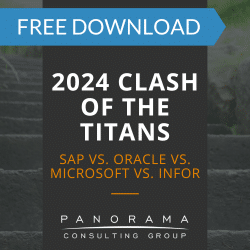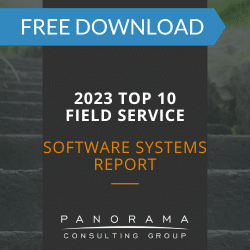You already know that ERP software can streamline your business processes and add structure and visibility to your supply chain. However, did you know that supply chain management (SCM) software also can help you achieve many of these same objectives?
That said, which type of software is best for your business? The answer isn’t always cut and dry, and it helps to know the major differences between the two. Today, we’re taking a closer look at the ERP vs SCM comparison so you can make an informed decision.
The 2024 Top 10 ERP Systems Report
What vendors are considering for your ERP implementation? This list is a helpful starting point.
ERP vs SCM: The Differences
Both ERP and SCM can provide a host of benefits. Yet, there will ultimately be one that aligns best with your enterprise strategy.
While ERP software can automate processes in almost any functional area, many organizations implement it primarily for back office processes. These might be accounting processes, HR processes or processes involved in other core functional areas. This back office focus is what sets ERP apart from SCM software.
On the other hand, SCM software focuses more on external-facing processes. For example, it allows you to better organize raw material data as it comes in from various suppliers. This empowers your company to make smarter and quicker business decisions to meet growing demands.
In addition to helping you manage the flow of your overall supply chain, SCM software includes features that help you monitor and optimize your relationships with suppliers, manufacturers and distributors. This can help you achieve supply chain cost reduction.
While many ERP systems handle these external functions, don’t assume a particular system can manage this unless you’ve confirmed that it has robust SCM functionality by asking your ERP vendor for a software demonstration. There are many types of ERP systems, and some have stronger SCM functionality than others.
Whether you’re evaluating SCM or ERP software, we recommend looking for a system that can offer enhanced visibility beyond the standard features. In addition, you should seek out systems with strong compliance control and risk management. These features are essential for companies experiencing supply chain disruption.
Integrating ERP and SCM Software
Both ERP and SCM can transform your organization from the inside out. If you decide to implement both, it’s important to note that integrating the two requires a careful, planned approach. Before you decide to take this best-of-breed approach, here are a few of considerations to keep in mind:
1. Ensuring Knowledge Around Technical System Integration
For any software project, the key is to make sure your team has the knowledge and skills necessary to tackle the various system integrations required. In many cases, you will need to look outside of your internal team and hire external resources.
If you rely on a team without ERP integration expertise, it can result in bad data transfers and exchanges that could be laborious and time-consuming to fix.

2. Determining Relevant Features
Whether you select an ERP or SCM system, you’ll need to determine exactly which features your business needs and which it can do without. This requires working with an ERP expert to understand the integration options for each solution and determining whether these can meet your supply chain requirements.
3. Setting a Budget
Integrating an ERP and SCM system to create a best-of-breed software solution can be pricy. While this strategy might provide the robust functionality you need, the price tag might reflect such specialization.
A best-of-breed solution is not just expensive from a technical standpoint but also from an organizational change management standpoint. Think about it – is it easier to learn how to use one new system or two?
Considering that there are so many unexpected costs, it’s important to set realistic expectations for your executive team.
What are Your Business Goals?
Before you can make a final decision on which system you need, it helps to take a closer look at your business goals. Where do you want to be, what do your customers expect of you, and what’s holding you back from reaching that potential?
To get clear answers, make sure to involve a variety of business stakeholders. If your IT team is leading the project, the project may become too focused on technology, and you might miss out on important inputs from business stakeholders.
ERP or SCM: Which System is Right for You?
As you consider the benefits of ERP vs SCM software, team collaboration will be critical at every point. Together, your employees, executives, IT managers and department leads can help steer your company toward the solution that makes the most sense for your current needs and future goals.
Along the way, an ERP consultant can help you navigate the journey. From ERP selection and contract negotiations to business process reengineering, we can help every step of the way. Request a free consultation below.














